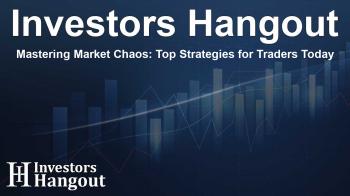Mastering Market Chaos: Top Strategies for Traders Today

Embracing Market Volatility: A Trader's Guide
In today’s fast-paced trading environment, uncertainty and volatility are the constant companions of every trader. The market swings can feel overwhelming, but with the right strategies in hand, uncertainty can transform into lucrative opportunities. A new era in trading demands that you actively engage with market fluctuations. Here are five essential tips for navigating this unpredictable landscape.
Understanding the Nature of Volatility
Market unpredictability often reflects broader economic uncertainties. Factors such as geopolitical tensions, inflation concerns, and policy changes can trigger swift movements in asset prices. Understanding these factors is crucial. For instance, when significant political events unfold, there can be immediate market reactions, leading to increased trading activity. Traders who are aware of this can strategize effectively around these events.
Essential Strategies for Trading in Turbulent Times
1. Manage Your Position Sizes Wisely
When volatility strikes, it's time to assess your risk carefully. Smaller position sizes can be your safeguard, allowing you to maintain a grip on your trades and limit potential losses. During sharp market moves, large positions can lead to significant setbacks; thus, keeping trades manageable can preserve your capital in chaotic times.
2. Diversification is Key
Diversifying your portfolio is one of the most effective ways to mitigate risk. Explore trading opportunities across various assets instead of focusing solely on one type. By spreading your investments, you reduce exposure to sudden declines in any single market, thus enhancing your resilience against market shocks.
3. Utilize Stop-Loss Orders
Establishing stop-loss orders acts as a protective measure against unfavourable price movements. They automatically close your position when prices hit a certain level, helping to minimize losses. If you’re not using stop-losses, consider setting them up; they provide much-needed discipline and control in a trader's routine.
4. Maintain Liquidity
In uncertain markets, cash can be your best friend. Keeping a portion of your portfolio liquid prepares you to seize unforeseen opportunities as they arise. Sharp market movements often present rapid buying opportunities for astute traders who have liquid cash available to act quickly.
5. Cultivate Emotional Independence
Trading can be an emotional rollercoaster, especially in a chaotic environment. It’s crucial to detach from your trades emotionally. Avoid holding onto losing positions in hopes of a rebound; instead, practicing swift decision making and admitting mistakes can help you remain a disciplined and effective trader.
Pro Trader Insights
Understanding your potential risks before initiating trades sets a solid foundation for your strategy. Always calculate the worst-case scenario to ensure that any potential losses align with your risk appetite. This thoughtful approach reduces anxiety and enhances decision-making under pressure.
Conclusion: Riding the Waves of Uncertainty
Navigating the ups and downs of volatile markets might seem daunting, but with nimble strategies, disciplined execution, and an informed mindset, traders can turn unpredictable moments into profitable ventures. Embrace the challenge with an adaptive spirit and transform market chaos into your competitive advantage.
Frequently Asked Questions
What is market volatility?
Market volatility refers to the degree of variation in trading prices over time, indicating how quickly or significantly a market moves.
How can I manage risk when trading?
Effective risk management can be achieved through strategies such as setting stop-loss orders and managing position sizes.
Why is diversification important in trading?
Diversification helps spread risk across various assets, minimizing the impact of adverse movements in any single investment.
What role does liquidity play in trading?
Liquidity allows traders to enter and exit positions quickly, which is essential during volatile market conditions.
How can I develop emotional discipline in trading?
Developing emotional discipline involves setting clear trading rules and sticking to them, avoiding impulsive decisions based on feelings.
About Investors Hangout
Investors Hangout is a leading online stock forum for financial discussion and learning, offering a wide range of free tools and resources. It draws in traders of all levels, who exchange market knowledge, investigate trading tactics, and keep an eye on industry developments in real time. Featuring financial articles, stock message boards, quotes, charts, company profiles, and live news updates. Through cooperative learning and a wealth of informational resources, it helps users from novices creating their first portfolios to experts honing their techniques. Join Investors Hangout today: https://investorshangout.com/
Disclaimer: The content of this article is solely for general informational purposes only; it does not represent legal, financial, or investment advice. Investors Hangout does not offer financial advice; the author is not a licensed financial advisor. Consult a qualified advisor before making any financial or investment decisions based on this article. The author's interpretation of publicly available data presented here; as a result, they should not be taken as advice to purchase, sell, or hold any securities mentioned or any other investments. If any of the material offered here is inaccurate, please contact us for corrections.
